|
It’s clear now why Nebraska’s low-income and minority children are struggling academically while their white and Asian counterparts are maintaining respectable levels of achievement. Nebraska’s education establishment is utterly unwilling to discuss the kinds of innovations that are closing and even reversing the achievement gap in other parts of the country. Nothing could be more illustrative than these adults’ reactions to a visit from Education Secretary Betsy DeVos this week. A strong advocate and benefactor of education reform for the past three decades, Betsy DeVos knows a thing or two about trailblazing for underprivileged children. She champions many forms of school choice, including charter schools, that have found innovative solutions to the very problems we're grappling with. Just this past month we learned that black and Hispanic students in Central Harlem charter schools are outperforming New York City’s white pupils by double digits. You would think that Nebraska’s educators would be curious about how we can use some of these ideas to help our own struggling black and Hispanic students. After all, only 22% of black students and 18% of Hispanic students in Nebraska are proficient in reading by the 4th grade, according to data from the National Assessment for Educational Progress. Instead of teaching students to be open-minded and forward looking, our education leaders in Nebraska taught kids some very different lessons this week by the way they responded to DeVos’ visit. Here are 5 of those lessons. 1 - People who think differently than you have nothing to offer. According to messaging coming from education leaders in Nebraska, the best way to approach new ideas is not by having an open mind but by “teaching a lesson.” Here’s a screenshot of LPS’s home page today. We’re not sure what’s going on in this picture, but the woman with the lizard looks a bit uncomfortable. LPS has framed this visit as an opportunity to teach Betsy DeVos a lesson. Besides being incredibly rude, this messaging teaches children that if someone disagrees with you, your obligation is to teach them to think like you do. If LPS were teaching critical thinking skills, their students would know that you can listen to or read a wide range of viewpoints without having to adopt any of them. They would also know that learning about diverse viewpoints is enriching and fulfilling. It helps you to understand the world around you and to see other people as complex human beings with experiences you can learn from. Instead, these educators are teaching students to be close-minded and rude. 2 - If you don’t like or understand a person’s ideas, protest and call her names. Strangely, the day after a visit from a U.S. cabinet official and a protest by 150 people, the Lincoln Journal Star has chosen not to include an article about the episode on its home page. If you do a little digging, however, you can find an article that claims that retired teachers, among others, were part of the protest at the zoo yesterday. If anyone should be teaching students to be open-minded and to learn all they can from the world, you’d think retired teachers would. These teachers and other adults at the protest are teaching children to avoid having conversations with people who think differently than they do. The appropriate response, as they demonstrate by their actions, is to hold signs, chant platitudes, and possibly even yell and call the person names. Apparently, this lesson has been taught for some time. Forty-five-year-old Courtney Lawton used a similar strategy recently when she yelled at a 19-year-old undergrad at UNL and called her despicable, slanderous names. The tragedy is that these two women could have had a civil and respectful conversation that could have led to increased understanding on both sides. Whether or not anyone would have been persuaded to change her mind, both would understand her fellow humans a bit more richly. It’s hard to have a conversation, though, when one person starts out with yelling and name calling. 3 - The status quo is always better than innovation because innovation is “unproven.” At a press conference on Wednesday, Superintendent Steve Joel said, “We have to be careful if in fact other concepts that are not proven to yield the kinds of results that we’re getting are being introduced against our will.” There’s a lot to say about this statement. We’ll stick with just two points. We don’t want to continue to get the results we’re getting. We want better results. There are already some options available in Nebraska that are getting better results, and we should make it easier for parents to access these options. The 70+ schools in the Omaha Catholic Archdiocese, for example, are getting much better results for less money. Tax-credit scholarships would make it easier for low-income families to access these schools. Secondly, let's address the "against our will" comment. Education opportunity and school choice are all about freedom. While a superintendent of a large Nebraska school district who makes north of $300,000/year certainly doesn’t want to have to compete with other schools (his will), many parents would like more options for their children (their wills). Whose interests are more important here? High-paid government employees or low-income children whose futures depend on their educations? Do we want to raise a generation of children who are learning that innovation shouldn't be trusted? Is this mind-set going to help them adapt to the ever-changing, fast-paced technological world we’re living in? 4 - “Others” are not human beings with good intentions or feelings. There are many adults in Nebraska who speak of Betsy DeVos as if she weren’t even human. In fact, we’ve seen people post images and gifs of Disney villains when they refer to her. Teaching students that it’s okay to turn fellow human beings into “others” (as referenced by the UNL English Department) limits their capacity to reason and to make connections with the world. The very idea is antithetical to the teaching of Humanities, and it creates mistrust and suspicion. All you have to do is look at the faces of the zoo school students to see that they’ve been indoctrinated well when it comes to viewing Betsy DeVos as an “other.” This is a tragedy because it closes doors and windows to students who will very much need to be open-minded in order to thrive in our increasingly diverse world. The Stanford Humanities Center explains that exploration of the humanities helps us to “learn about the values of different cultures” and ways of thinking, and it’s difficult to see how LPS could possibly teach humanities when it treats some humans with such disdain. 5 - Truth is relative when you need it to be. The double speak surrounding this event has been pretty incredible. Stand for Schools’ Ann Hunter-Pirtle, whose father Pat Hunter-Pirtle happens to supervise the Zoo School focus program, said in a single sentence that Nebraska already has school choice and that school choice is bad because it takes money from public schools. Neither of these seemingly contradictory statements is true or relevant to Secretary DeVos’ visit, but it doesn’t seem to matter. We currently rank #50 on the Opportunity Index (because we don't have school choice), and if more children attended private schools or even public charter schools (which are public), our existing districts would still retain some of that money without having to educate the kids, thus actually increasing funds for district schools. We’ve also seen statements about DeVos wanting to take protections away from rape victims, dismantle public schools, and make it financially impossible for students to attend college. After hearing all of these lies it must have been incredibly confusing for the zoo school students to meet a friendly, sincere woman who wanted to listen to them talk about their goals and experiences. That’s the funny thing about truth. It stays the same, whether or not you want it to exist. Kids eventually find out the truth. Will this discovery cause them to feel betrayed by the adults who repeated the lies? Or will it cause them to further retreat into the lie in order to avoid the discomfort of coming to terms with the truth? People are still grappling with what this whole experience meant to Nebraska and to individuals touched by it. Hopefully, we can spend some time thinking about the people this is all supposed to be about: the kids. It appears that at least one adult managed to stay focused on them during the Secretary’s visit.
0 Comments
The Nebraska State Education Association must be losing members to what they call “‘alternative’ out-of-state orgs.” They’ve been sharing a graphic on social media that includes 20 questions that “should be asked of any professional teachers’ organizations you might consider joining!” This campaign highlights the intellectual contempt with which the union treats its members. Instead of talking to Nebraska teachers like the college-educated professionals they are, the union talks down to its members and superimposes their own interests on the people whose interests they profess to represent. What are these “alternative” orgs referred to? Perhaps they’re referring to organizations like the Association of American Educators (some teachers in Nebraska join the AAE instead of NSEA). AAE is a national organization that offers a variety of benefits to its members such as $2,000,000 in liability insurance (twice as much as NSEA offers its members), legal protection, scholarships and classroom grants, and professional resources. If you look at the AAE website, you’ll notice a quite different tone. They treat their members like the professionals they are. They don’t make silly demands of them or try to scare them into taking a certain political position. Besides better treatment from their professional organization, why would Nebraska teachers join AAE when the NSEA already has their backs? Here are a few reasons: Fairweather Representation The first question Nebraska teachers are instructed to ask on the NSEA’s new graphic is this: “How many teachers have you represented before any Nebraska school board in the last year?” Undoubtedly, NSEA has “represented” teachers before school boards; however, NSEA representatives have also thrown Nebraska teachers under the bus before school boards as well. Here’s an example. In the fall of 2014, several teachers at a Lincoln middle school had concerns about comedian-produced gender spectrum handouts distributed at a teacher training meeting. They didn’t feel that their concerns would be well-received, so they approached students’ parents about addressing the topic at a school board meeting. Were these teachers represented well by the local and state teachers union? Here’s what Jenni Benson, current NSEA president and then-LEA president, had to say at that school board meeting(around the 20:00 mark): “We would like to offer our support for the training being offered to staff that includes the awareness of how to work with transgender students.” In other words, we union leaders don’t care about the concerns of the parents or the teachers who are actually in the classroom with the students. We expect all the teachers to take our position. If the organization was actually interested in “representing” the people they claim to represent, the LEA could have sent someone to the school board meeting to offer a message like this: “We recognize that this is a topic on which honest and intelligent people have many different opinions. We are here to represent our professionals but not to tell them how to think. We do have a concern, however: we don’t think it’s healthy for our teachers or their students to be working and learning in an atmosphere which squashes certain viewpoints and encourages the shaming and bullying of people who hold certain views. It's troubling that these teachers felt they couldn't express their concerns to their employers and may have even feared for their jobs simply for sharing their opinions. We encourage the school district to adopt a policy of academic freedom and to cultivate an atmosphere of respect for diversity of thought (including respect for well-established biological facts).” In summary, board representation by the NEA, NSEA, and LEA is only advantageous for someteachers. Others clearly need an alternative. Discriminatory Suggestions In Jenni Benson’s school board speech mentioned above, she also said, “LEA believes that a diverse society enriches all individuals. Similarities and differences among race, ethnicity, national origin, religion, language, geographic location, gender, sexual orientation, gender identification, age, marital status, physical size, mental ability, occupation, and economic status form the fabric of society. We believe that education should foster the values of appreciation and acceptance of various qualities that pertain to individuals as members of those diverse populations.” The NSEA’s new campaign doesn’t really subscribe to these ideals, however. On Twitter, they’ve suggested that out-of-state orgs make “false promises” and that only a “lifelong Nebraskan” or a “Nebraska attorney” can be helpful to teachers in Nebraska. This sounds an awful lot like discrimination based on “geographic location” and even “national origin.” Is the NSEA suggesting its members discriminate based on these factors? Doesn’t diversity “form the fabric of society”? Disregard for Individual Careers Professionals in all industries look for chances to improve their skills and make clear progress toward their goals. In many cases, this is done by getting a job with a different employer or trying to learn new skills in a different kind of job. In Nebraska, teachers’ careers are stifled by the lack of diverse employers. Teachers can work at traditional public schools or at private schools, but that’s about all we have to offer these professionals. In other states, teachers can also work at public charter schools, online charter schools, and a plethora of innovative new private schools that are springing up in the wake of tax-credit scholarships and education savings accounts. These school choice options offer all kinds of career development tracks that Nebraska teachers don’t have because the groups that supposedly “represent” them fight tooth and nail to maintain the tired old status quo. For example, in a school choice state, a teacher with a young family of her own can teach part-time through an online charter school and stay home with her kids for the first few crucial years. A successful older investment broker could use his college education and years of professional experience to teach economics or accounting at a magnet school, thus giving students amazing access to a rich career of experience while fulfilling his own dream of giving back to society. These scenarios are playing out all over the country--but not in Nebraska. The NSEA is using all of its resources to prevent teachers from having these kinds of opportunities.
It’s All Politics The “20 Questions” infographic put out by NSEA makes their priorities very clear. They don’t get as excited about defending teachers’ rights and providing professional development as they do about “funding,” “full-time lobbyists,” electing “friends of public education” to office, employing Nebraska attorneys, and staffing their “state office.” Some teachers are very committed to the NSEA goals, and that’s totally fine. If you’re a teacher who is into the politics of maintaining the current status quo, then joining the NSEA makes a lot of sense. But don’t buy into the rhetoric that the NSEA and LEA are all about helping you to develop your career. Their goals are to collect more dues and increase their political power. Do You Really Need a Professional Organization? There are alternative organizations out there that can provide you with professional training and resources, liability insurance, and even legal help. But do you really need such an organization? Most college-educated professionals do their jobs just fine without such organizations. If people feel they need liability insurance, they obtain a personal umbrella policy. If they want to learn more about the latest research, they subscribe to trade journals or read up on professional blogs or attend conferences that focus on their specialties. If they need legal advice, they contact an attorney. Don’t let the NSEA talk down to you and convince you that you don’t have what it takes on your own. You’re a teacher! You can negotiate your own salary and form your own opinions. Your thoughts and opinions are just as valuable as anyone else’s. School choice is as good for teachers as it is for students. Just look around the country at the fantastic job opportunities brought to teachers as a result of school choice. Jenni Benson doesn’t have a right to squash your free speech or tell you which viewpoints are acceptable. You’re not contracted to hold certain opinions just because your paycheck is issued by LPS. LPS is owned by the taxpayers of Lincoln, and the taxpayers of Lincoln are a very diverse group. Groupthink is highly overrated in general and extremely destructive in education. Use that incredible brain of yours to form intelligent opinions, and then use your teacher heart to stand up for them. Many will appreciate your valor. Finally, if you do choose to join a professional organization, don’t use the NSEA’s 20 questions for your research. Use your own. The NSEA doesn’t know you and your goals like you do. Nor do they seem to care. |
|


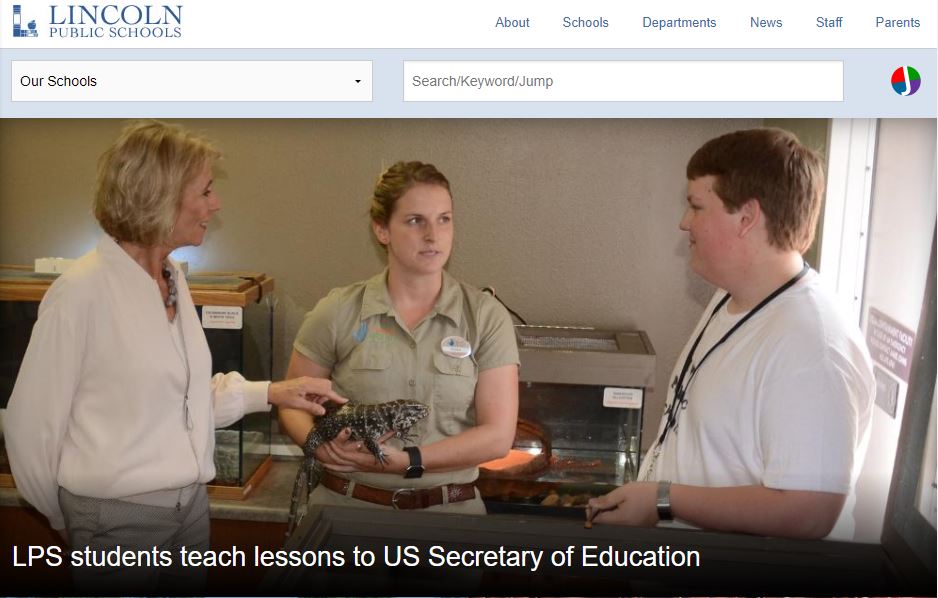
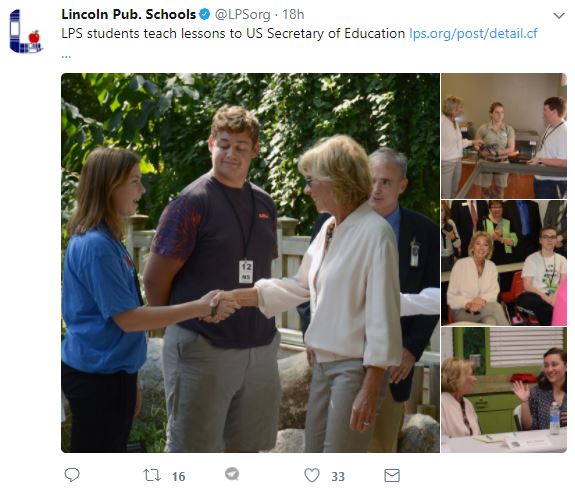
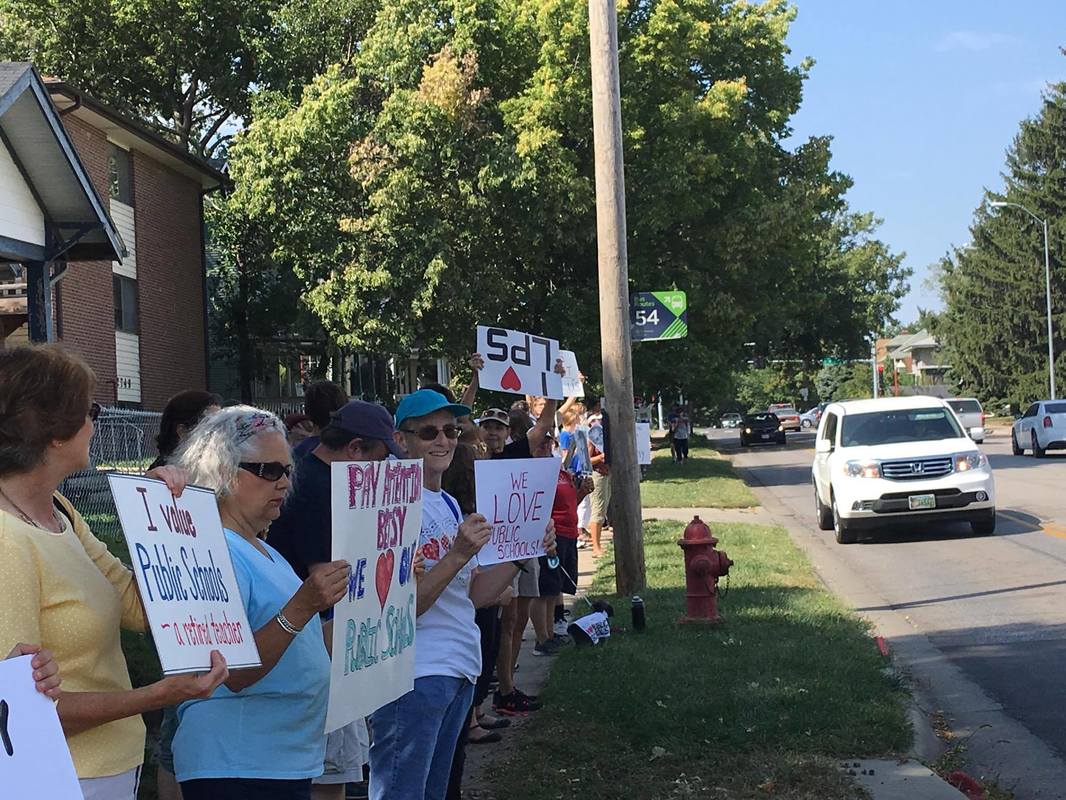
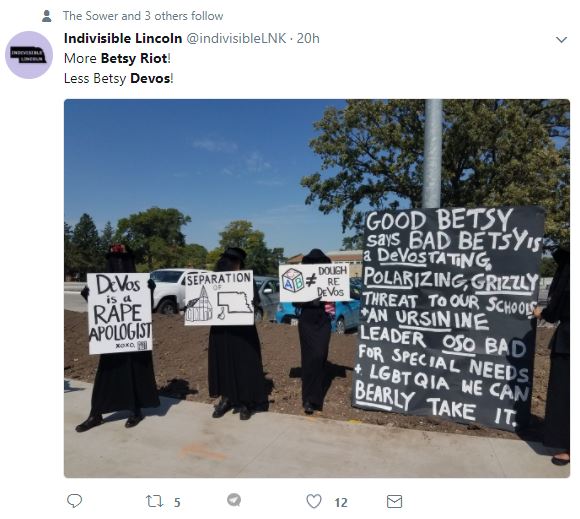
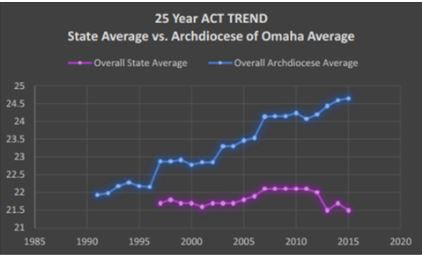
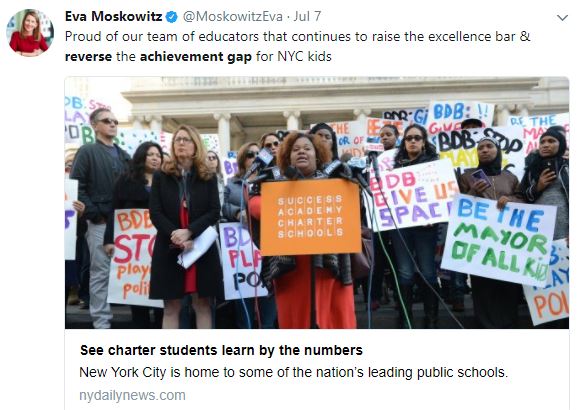

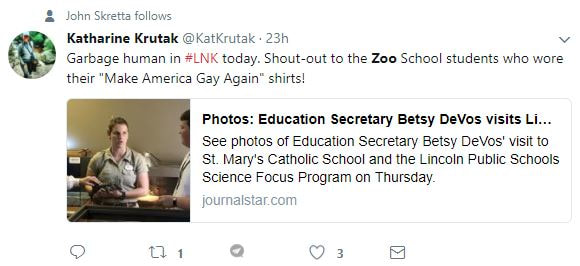

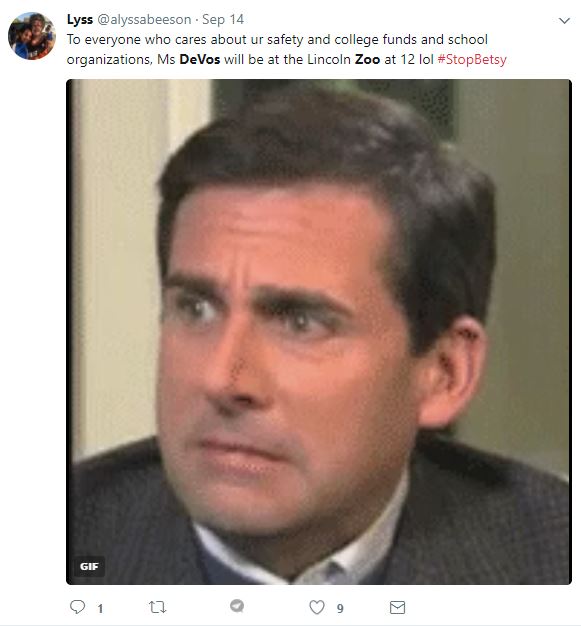
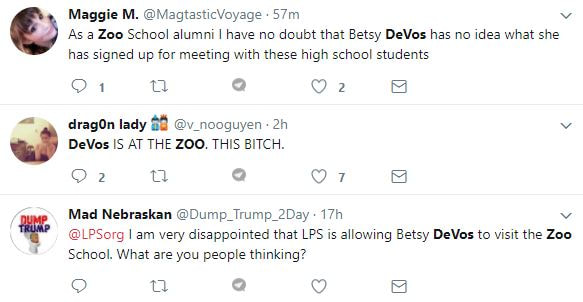
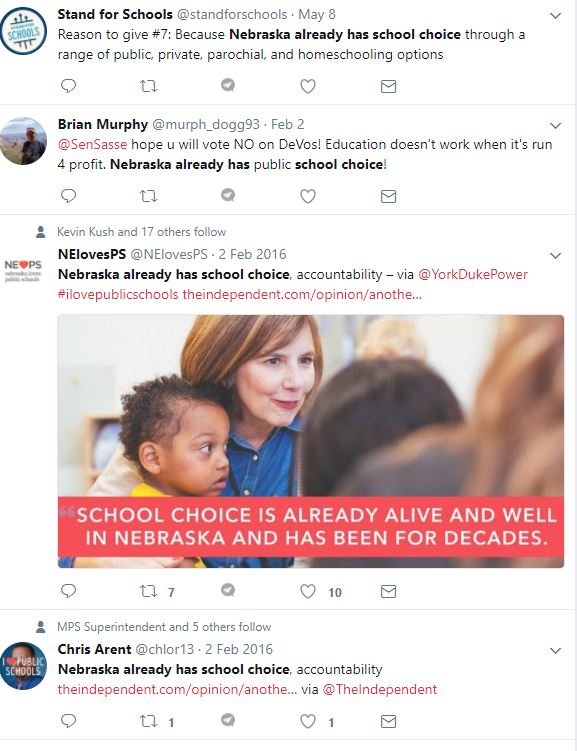


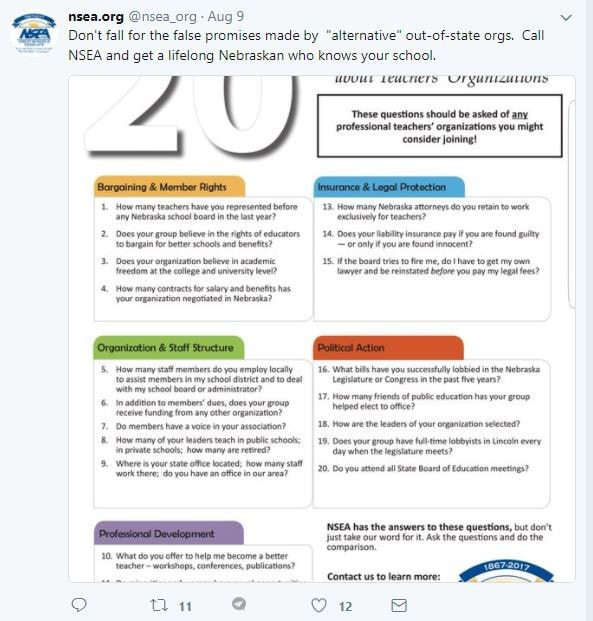
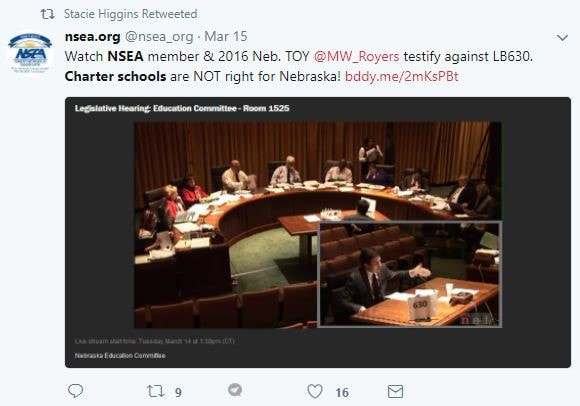
 RSS Feed
RSS Feed